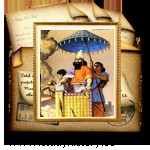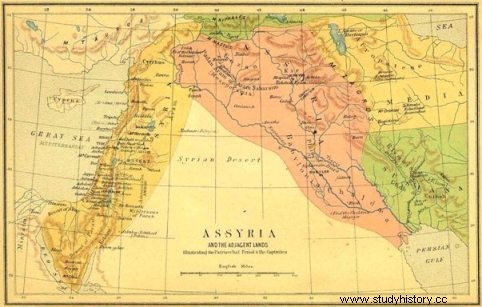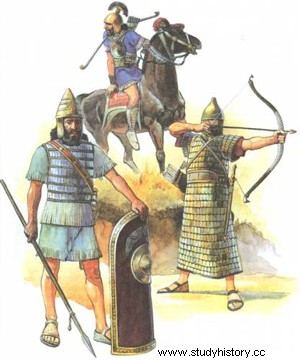 Perhaps in ancient times there was no people who worshiped strength and power like the Assyrians. During the reign of King Sennacherib (about 700 BC), Babylonia, Syria, Palestine with Judea, and certain regions of Transcaucasia were part of the Assyrian state. Under the heirs of Sennacherib, Assyria also annexed Egypt and Elam for some time. Sennacherib and his heirs managed to conquer almost "the entire inhabited world" (of course, within the limits known to the Assyrians).
Perhaps in ancient times there was no people who worshiped strength and power like the Assyrians. During the reign of King Sennacherib (about 700 BC), Babylonia, Syria, Palestine with Judea, and certain regions of Transcaucasia were part of the Assyrian state. Under the heirs of Sennacherib, Assyria also annexed Egypt and Elam for some time. Sennacherib and his heirs managed to conquer almost "the entire inhabited world" (of course, within the limits known to the Assyrians).
The history of Assyria began quite peacefully. Its ancient capital was the small city of Ashur, from which the whole state later received its name. If we could walk its streets in, say, 1900 B.C. e., then they would meet few warriors, but many merchants. How did it happen that a small trading city turned into the center of a huge power that terrified the peoples of Asia Minor? Let's try to figure out this difficult story together.
Ashur was located on the upper reaches of the Tigris River, where mostly Semitic peoples lived. Trade routes of the ancient world converged here. From north to south, in Mesopotamia, they brought gold and silver, copper and tin, and slaves. Grain and vegetable oil, products of skilled artisans, were sent to the northern lands for sale. The inhabitants of Assur eventually realized that they could get rich by buying goods in some countries and reselling them in others. Only smart, cunning and courageous people could engage in intermediary trade. The merchant had to fight off the attacks of robbers; he had to be able to get along with the leaders of the wild tribes from whom he bought slaves; he had to know the languages, manners and customs of foreign countries, be courteous to the kings and their nobles, because the most expensive goods were sold in the royal palaces. For the convenience of trading in foreign lands, merchants built their own villages, lived there among the local people, and only occasionally returned to their homeland for goods.
In Ashur itself, the wealthy merchant elite ran all the affairs of the city. High positions in the city administration were occupied by priests of the most revered temples. There were no kings in Assur yet. The city grew and grew rich without the need for distant military campaigns.
The Assyrians lived in the fertile steppe foothills. The land here produced abundant crops without additional irrigation, so irrigation canals and earthen dams were most often not needed. A large peasant family cultivated their allotment on their own, without asking for help from either neighbors or the temple, they grazed bulls and sheep in the wide and free surrounding steppes. The Assyrian peasant could feed himself and his family, was free and independent, paid relatively small taxes.
It may seem strange, but it is precisely because of its prosperity that the Assyrian village has hardly changed over the centuries. The primitive order, the complete power of the father over all family members, and very strong ties between the communal peasants were preserved in it for a long time. The villages regularly supplied food taxes and young lads to the city to replenish the army, and the city hardly interfered in rural affairs. An independent, prosperous peasantry was the main pillar of the Assyrian state.
Ashur's peaceful and prosperous life was first threatened around 1800 BC. e. At this time, the neighboring states of Babylon and Mari, and later the new kingdom of Mitanni and the Hittites, began to oust Assyrian merchants from their homes and rich markets. Ashur tried to fight, but he did not have enough strength for an unequal struggle, and he lost his independence. For several centuries, the trading city on the Tigris goes into the shadows.
 About 1350 BC e. Assyrians again became independent from Mitanni and Babylon thanks to the help of their allies - the Egyptians. Now it was necessary to seize the roads that led to the Mediterranean coast, to the rich Syrian cities. The most important section was the crossings over the Euphrates River, which no merchant could pass. To achieve independence and to fight for their interests, a disciplined, well-organized, strong army was needed under a single leadership. So the mayor of Ashur (“ishshiakkum”), whose power was inherited, gained strength and took the royal title.
About 1350 BC e. Assyrians again became independent from Mitanni and Babylon thanks to the help of their allies - the Egyptians. Now it was necessary to seize the roads that led to the Mediterranean coast, to the rich Syrian cities. The most important section was the crossings over the Euphrates River, which no merchant could pass. To achieve independence and to fight for their interests, a disciplined, well-organized, strong army was needed under a single leadership. So the mayor of Ashur (“ishshiakkum”), whose power was inherited, gained strength and took the royal title.
Fortune comes to the Assyrians. They crush the kingdom of Mitanni, located in the middle reaches of the Euphrates, annex part of its territory, build fortresses near the river, and for two centuries (1300-1100 BC) hold the crossings across the Euphrates leading to the sea. Due to this, they restrict the trade of rivals and collect large duties from merchants. Sometimes the Assyrian army went on long campaigns. Returning from such a campaign with great booty, the king often built a capital-fortress, guarding his treasures in it. The last and most luxurious of these capitals was later Nineveh, the most famous of the Assyrian cities. Ancient Ashur is increasingly receding into the background:the streets of new cities are no longer filled with merchants, but with soldiers.
The Assyrians' military successes were brilliant, but the weakness of royal power still affected. Priests and nobility did not need a strong king. They are used to running the country themselves. Even the famous commander, the conqueror of Babylon, King Tukulti-Ninurta I (1244-1208 BC) was declared insane and deprived of the throne, as soon as he tried to establish his unlimited power in Assyria and introduce magnificent court ceremonies according to the Babylonian model. The country was still ruled by rich merchants and priests; they yielded glory and booty to the king, but not power. In peacetime, the tsar locked himself in his treasury capital, and no one felt a special need for him.
This order was broken around 1100 BC. e. invasion of nomadic Aramaeans. The Assyrians lost all possessions on the Euphrates, part of the territory on the Tigris and retreated to the near foothills. The nomads dealt an even stronger blow to neighboring countries. Therefore, when the Assyrians recovered and began new conquests in Asia Minor (about 900 BC), they did not have worthy rivals for another hundred years.
The Assyrian kings took advantage of the circumstances and greatly strengthened their power. They used a new method of warfare, which frightened all the peoples of Asia Minor (see the article "Military Affairs of the Ancient East"). The Assyrians always attacked unexpectedly and quickly, like a lightning strike. Most often, prisoners were not taken:if the population of the captured city resisted, then it was completely destroyed as a warning to all the disobedient. Seeking obedience from the vanquished, they were deprived of their homeland, driving thousands of new subjects of the king to other places, often very far away. Everything was done in order to frighten the conquered peoples, to break their spirit, their will to freedom. The Assyrians plundered conquered countries for decades.
 However, the formidable Assyrian kings were unable to unite the conquered countries and create a strong state for a long time. The vigilance of the eagle helped them quickly notice rebellions on the outskirts of the state, the lion's courage to confront enemies in open battle, the stubbornness of the bull helped out when defeat seemed inevitable, but these qualities were not enough to solve new problems.
However, the formidable Assyrian kings were unable to unite the conquered countries and create a strong state for a long time. The vigilance of the eagle helped them quickly notice rebellions on the outskirts of the state, the lion's courage to confront enemies in open battle, the stubbornness of the bull helped out when defeat seemed inevitable, but these qualities were not enough to solve new problems.
It turned out to be impossible to endlessly plunder the conquered countries:there was no one to sow their own fields and engage in crafts. The Assyrians had too many military leaders and too few officials to collect taxes. The scribe could replace the soldier only where the population voluntarily agreed to live under the rule of the Assyrians. There were no such peoples in the Ancient East - everyone hated the invaders.
The Assyrians also had difficulty with trading cities, which throughout their history enjoyed special rights:they did not pay high taxes, their inhabitants were exempted from military service. The Assyrians did not want to keep these privileges, but they also could not abolish them, fearing constant rebellions.
One such free city was Babylon. The Assyrians mainly adopted culture, religion and writing from Babylon. The respect for this city was so great that for some time it became, as it were, the second capital of Assyria. The kings who ruled in Nineveh made rich gifts to the Babylonian temples, decorated the city with palaces and statues, and Babylon nevertheless remained the center of dangerous conspiracies and rebellions against the Assyrian authorities. The matter ended with the fact that King Sennacherib in 689 BC. e. ordered to destroy the whole city and flood the place on which it stood (see Art. "Babylon"). The terrible act of the king caused discontent even in Nineveh itself, and although the city was quickly rebuilt under the son of Sennacherib Assarhaddon, relations between Assyria and Babylon deteriorated completely. Assyria was never able to rely on the authority of the most important religious and cultural center of Western Asia.
But the main problem of the Assyrians turned out to be closely related to their brilliant military victories. In wars with a strong and young state of Urartu
(800-700 BC) the Assyrian empire was on the verge of defeat more than once. To win, the Assyrians replaced (about 750 BC) the militia with an army consisting of mercenary soldiers specially trained in military affairs. To maintain such an army, the kings were forced to go on predatory campaigns again and again.
Since that time, the position of free peasants - the former militias - has been rapidly deteriorating. The nobles begin to enslave and enslave them. Dispossessed Assyrians, mingling with unfree people driven from distant lands, find themselves in a minority in their homeland ... The power of a great power begins to weaken rapidly. And in 614 BC. e. the Medes took the ancient capital of the country Ashur, and two years later they, in alliance with the liberated Babylon, defeated Nineveh.
Assyria has disappeared from the face of the earth. It turned out that it was impossible to create a strong state with the help of fear, violence and robbery. This is also taught by the history of a small town, the merchants of which at first wanted only one thing - to freely trade in the peaceful eastern markets.
From the materials of the Historical Encyclopedia.
